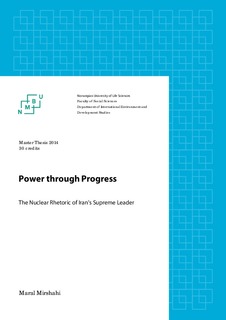| dc.description.abstract | In this analysis, I ask the question: How has the Supreme Leader of Iran justified the nuclear program domestically between 2003 and 2013? Puzzled by how the Supreme Leader, Ayatollah Khamenei, has maintained support for a nuclear program that is very costly for the Iranian society – both in the political, economic and social sense – I explore his nuclear rhetoric addressing domestic audiences.
Ayatollah Khamenei’s rhetoric is central for understanding Iranian nuclear politics. His authority to determine nuclear policies depends on internal legitimacy. His nuclear decision must be justified within the Iranian society, because audience costs matter – also within the Iranian theocracy. Through the systematic analysis of primary sources in Farsi and English, this analysis aims to fill a knowledge-gap, by providing new empirical insights into the domestic politics of the Iranian nuclear program.
By applying quantitative and qualitative methods, I investigate the manifest and latent content of the Supreme Leader’s nuclear rhetoric to domestic audiences. The content analysis shows that the Ayatollah justifies nuclear progress primarily on the basis of nationalism, ideology, religion and self-esteem. Contrary to what many scholars propose, the findings show that limited attention is given to nuclear denial and external security. The Supreme Leader’s legitimacy mainly relies on political actors and the general public in Iran. Khamenei justifies nuclear progress as a way of engaging in economic and scientific jihad ; as a means to fighting external threats and increase national and international power; and as serving the religious and ideological ends of resistance, independence and justice. By pursuing nuclear progress, the ideology on which the Islamic Republic is based upon will be enforced and secured. By maintaining a rhetoric that focuses on the revolutionary ideology and Islam, the Supreme Leader upholds the domestic consensus on the nuclear question. | nb_NO |
